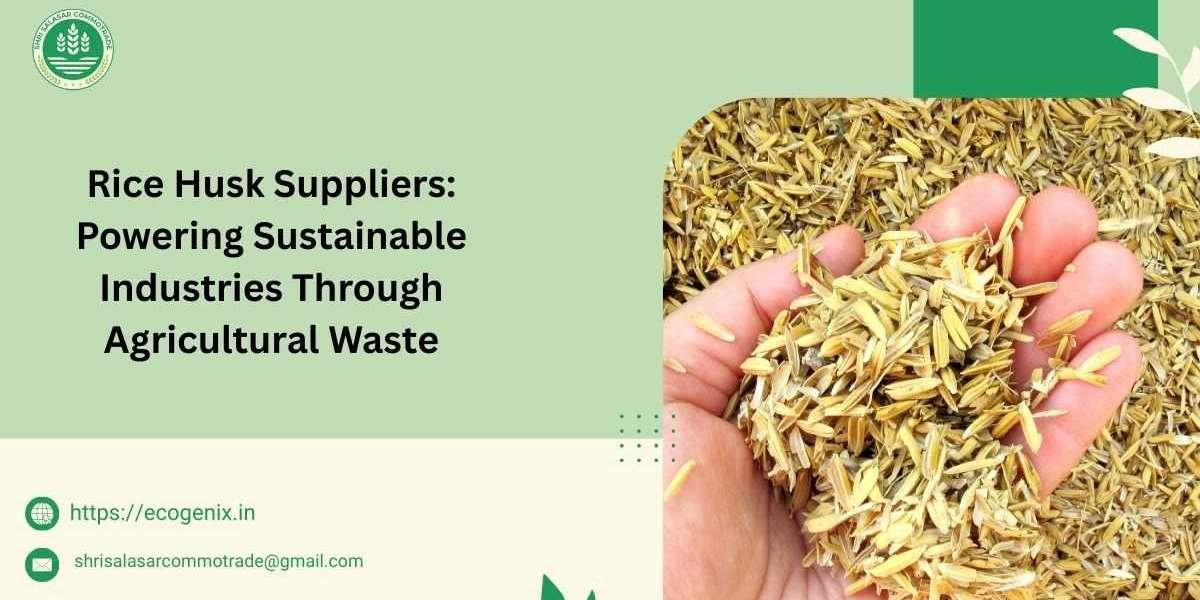Rice Husk Suppliers: Powering Sustainable Industries Through Agricultural Waste
Introduction
In an age where sustainability is no longer optional but essential, industries across the world are turning toward eco-friendly raw materials. Among the unsung heroes of this green revolution is rice husk, the protective outer layer of rice grains, typically discarded as agricultural waste.
But today, this byproduct is emerging as a sustainable resource, fueling energy, construction, packaging, and even biotechnology industries. Behind this transformation are rice husk suppliers, who are bridging the gap between agricultural waste and industrial innovation.
What is Rice Husk and Why Is It Valuable?
Rice husk (also known as rice hull) is the hard, outer shell of a rice grain, removed during milling. It accounts for about 20% of the paddy by weight and is usually discarded or burned in open fields, causing pollution.
However, rice husk contains:
- 35% cellulose
- 20% lignin
- 15–20% silica
This unique composition makes it valuable for:
- Fuel and energy production (biomass)
- Construction materials (bricks, cement alternatives)
- Soil enhancers (biochar)
- Industrial fillers (rubber, plastics)
- Activated carbon
The Rise of Rice Husk Suppliers
Rice husk was once considered a disposal problem. Today, it's a green commodity. The shift was driven by:
- Global demand for sustainable alternatives
- Tightening environmental laws
- Advances in husk processing technology
Rice husk suppliers emerged as crucial players collecting, storing, treating, and delivering rice husk in raw or processed forms (ash, pellets, briquettes) to various industries.
They operate in:
- Rice-growing regions of Asia, Africa, and South America
- Near agro-processing mills
- In coordination with farmers, co-operatives, and agri-processors
Types of Rice Husk Products Supplied
Depending on the industry and purpose, rice husk suppliers offer different forms:
Raw Rice Husk
- Light, fibrous, and dry
- Used in composting, mushroom cultivation, packaging, insulation
Rice Husk Ash (RHA)
- Generated by burning husk in controlled conditions
- Rich in silica (85–95%)
- Used in cement, ceramics, refractories, and concrete
Rice Husk Briquettes Pellets
- Densified for use as fuel
- High calorific value (~3500 kcal/kg)
- Used in boilers, kilns, and power plants
Carbonized Rice Husk
- Used in water filtration, odor control, and soil improvement
Rice Husk Powder
- Ultra-fine form for use in rubber, plastics, and cosmetics
Industries Benefiting from Rice Husk Suppliers
Biomass Energy Industry
Rice husk is used as an alternative to coal and LPG in:
- Boilers
- Power generation
- Gasifiers
Suppliers play a key role in providing consistent moisture-controlled biomass for energy producers.
Construction Building Materials
Rice husk ash is used as a:
- Cement substitute
- Filler in concrete
- Binder for eco-friendly bricks
Eco-concrete using RHA has lower CO₂ emissions, and suppliers ensure that only ash with appropriate silica levels is delivered.
Chemical Industrial Fillers
Silica extracted from rice husk is used in:
- Rubber reinforcement
- Paints and coatings
- Plastics and composites
Suppliers offer processed husk and ash with specific particle sizes and purity.
Agriculture Horticulture
Farmers and landscapers use:
- Husk as a mulch or compost component
- Biochar as a soil enhancer
Suppliers provide in bulk for organic farms, hydroponic setups, and nurseries.
Cosmetic Wellness Industry
Rice husk powder is used in:
- Exfoliants
- Herbal products
Here, microbial safety and fine grinding are handled by specialized suppliers.
Role of Rice Husk Suppliers in the Supply Chain
Sourcing
Suppliers work directly with:
- Rice mills
- Paddy fields
- Cooperatives
They establish contracts or long-term buy-back agreements to collect husk in large quantities.
Quality Control
Husk needs to be:
- Dry (moisture below 10%)
- Free of impurities
- Stored in ventilated, rodent-proof warehouses
Suppliers often test for:
- Moisture content
- Silica concentration
- Ash value (for fuel applications)
Processing
Depending on client needs, husk is:
- Dried
- Milled
- Pelletized
- Carbonized or incinerated for ash
Processing is either done in-house or outsourced to trusted partners.
Packaging Logistics
Delivering in:
- Bulk containers
- Jumbo bags (1 MT)
- 25–50 kg bags for smaller users
Suppliers also manage international shipping, often exporting to Europe, Japan, and the Middle East.
Sustainability Circular Economy Benefits
Rice husk suppliers are key players in:
- Reducing agro-waste pollution
- Substituting non-renewable materials (coal, sand, silica)
- Lowering carbon footprints in construction and energy
- Enabling zero-waste farming through biochar and compostable husk
By converting waste into value-added products, suppliers close the loop in the agricultural supply chain.
Future Outlook for the Rice Husk Market
- Rising demand for bio-based materials is pushing husk into new industries like packaging and cosmetics.
- Carbon credits may open new revenue streams for suppliers using husk for renewable energy.
- Technological advances in silica extraction from rice husk ash will increase demand for lithium battery and solar panel production.
The global market for rice husk ash alone is projected to exceed $2 billion by 2030.
Note:- Purchase affordable rice husk ash in India
Conclusion
Rice husk is no longer just a farm byproduct; it’s a sustainable raw material with enormous industrial potential. At the heart of this transformation are rice husk suppliers, who collect, process, and distribute this natural resource to the world.
Whether it’s reducing pollution, replacing non-renewable materials, or powering cleaner energy systems, rice husk suppliers are quietly driving some of the most important environmental shifts of our time.
For industries looking to go green without compromising performance or profitability, partnering with a reputable rice husk supplier could be the smartest move yet.








